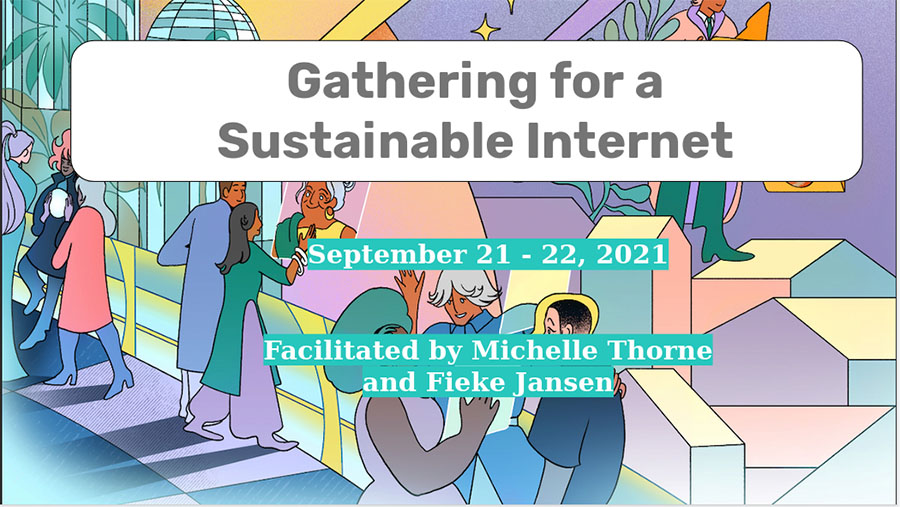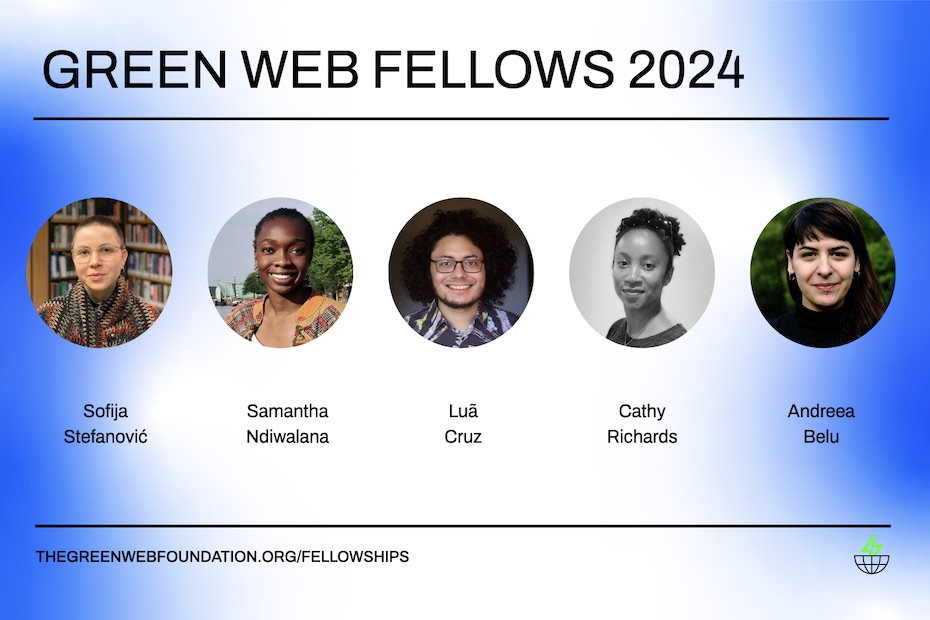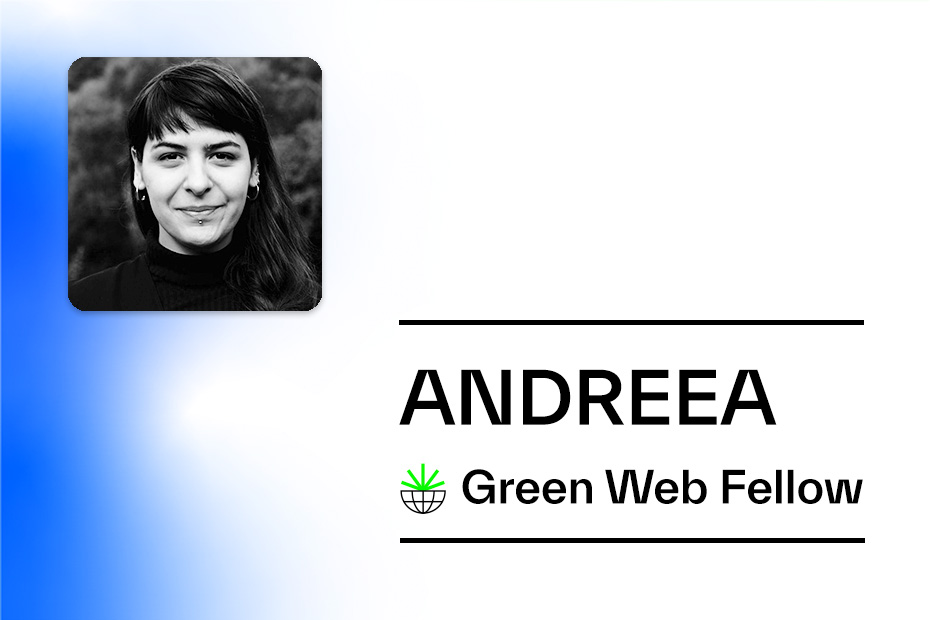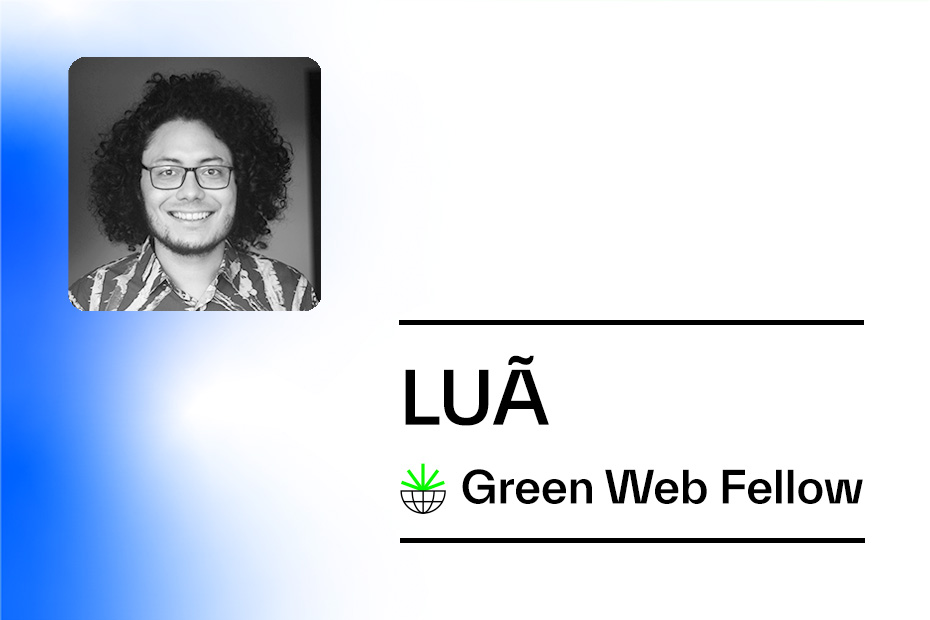Image credit: Gica Tam
Last year we organized a foresight workshop on Sustainability and Trustworthy AI . Where we brought together experts in digital rights, AI technology, racial justice and the climate movement in Europe to explore the intersection between AI and the climate crisis. This year we continued the conversation in a ‘Gathering for a Sustainable Internet’. This post offers a reflection of the conversations we had in this gathering.
The need for a sustainable Internet is becoming more urgent, yet entrenched interests are outspending and undermining real efforts to tackle these crises.
We’ve heard from many practitioners that they would like to meet others who are challenging the status quo and building alternatives and that there is a need for movement-building moments around climate and technology.
The Gathering for a Sustainable Internet convened around 25 digital rights, climate justice, and open/green technology practitioners thinking at a “network level” about these challenges. We sought to work with people interested in building bridges, working in coalition with each other, and collaborating at scale.
Over two half-day sessions, we set out to:
- Learn about each other’s perspectives in digital rights, climate justice, openness, and greening the Internet.
- Uplift pilots and prototypes that are working in promising ways.
- Identify assets and gaps to mobilize more effectively.
- Map paths to influence funding, legislation, and innovation.
- Spark collaboration and strive toward broader and more integrated strategies.
What’s next
There was a clear interest in continuing the conversation, so the next gathering will be held within the next six months.
A recurring theme is the desire to create a shared understanding and vocabulary around a just and sustainable Internet. A number of promising initiatives are underway and are outlined in more detail below.
Before the next gathering, we will reflect on who was missing and which perspectives should be centred. By then, there will also be new insights, research and projects that can benefit this larger effort.
What we discussed
How do we reign in greenwashing? The session was proposed to discuss greenwashing resulting from the lack of transparency of what it means for the internet ecosystem to be green and sustainable. Since all reporting in the sector is voluntary, with open frameworks offering guidance, it is all too easy to market a business as “green” — as claims have no common or even comparable benchmark. This conversation quickly moved from standards in green measurements to the root cause of greenwashing, obfuscating “the privatization of gains and the socialization of losses”. For example, how Big Tech responds to climate change centres on making datacenters more energy efficient and green through the use of green energy and natural cooling. Obfuscating, the internet’s original sin, the ad-tech business model and the computational power needed for it to flourish. Or how social media platforms allow climate misinformation to thrive and directly fund it through the advertising ecosystem. Thus, countering greenwashing requires challenging the green claims made by technology companies and unpack the corporate interest and market logic that is obfuscated by it. .
Creating a shared vocabulary, common language, and narrative: Vocabulary and language are important for the creation of useful narratives that drive meaningful action, and this process is happening very slowly. For example, in Europe, on the topic of digital sustainability there are varying terms, in France people talk about “digital sobriety,” whereas in some circles in Germany it is referred to as “digital sufficiency.” Academic and institutional language can also make the conversation difficult, as it is not the language of those working on environmental justice at the grassroots level. These changes in tones and subtleties show how different values are portrayed, as well as different goals regarding environmental sustainability. It also drives narratives. For example, concepts like “climate change” may tend to sound outdated or not as important as they were in the past, versus “environmental emergencies,” which encompasses more than climate impacts and the urgency of the issue. This group also spoke about the challenges of money within the current environmental narratives: Money can’t fix those inequities and imbalances – injustice can’t be fixed by writing checks. As an alternative, a view of shared scenarios is needed to drive the conversation.
What does it mean to centre on justice? Can we decentralize the conversation, what are common values, connect with others and who is missing (for example, land activists in the Global South). In this regard, the group brought up a few points. First, the need to engage with the oppressed communities by meeting them in their own spaces: where they are, what they desire and enjoy, and what bothers them. Second, that most of the activism for a clean Internet comes not from within it but is rather happening offline, for example, near lithium extraction sites or data centers with large water consumption that affects communities. Third, a culture of Internet sustainability must include how people in different parts of the world make use of the Internet or even reject its use.
Network mapping: Where are we? What are we good at? What and who are missing to scale up the efforts? This is a subject that interests a great deal of Internet practitioners, but takes a great effort, especially due to power asymmetries. Some of the ideas brought up are: 1) We need to clarify our scope and a vision of what we want. 2) To map and know who to reach out to, and for what purpose. 3) To work with people working at the network-level. Finally, a strong and diverse theory of change is needed to bring communities to discuss issues and to take action.
What people are working on
In a round of virtual speed geeking, several participants shared their work:
- Open Climate. We are a group of people that started thinking: is there a connection between “all things open” and “all things climate?” We’ve explored this question in a set of public, open calls, where we invite others to participate and share their view. You can see some of our thoughts on the subject of openness and climate action, as well as our past calls.
- The Association for Progressive Communications (APC) highlighted a number of projects from their Technology, environmental justice and sustainability initiative, including a guide to the Circular Economy of Digital Devices, and the 2020 GISWatch edition on: Technology, the environment and a sustainable world: Responses from the global South. (Shawna Finnegan)
- Sustainable Digital Infrastructure Alliance (SDIA). How to work collaboratively across the entire digital economic value chain to realize sustainable digital infrastructure by 2030 (Michael J. Oghia)
- Cathleen Berger. Shared lessons learned around GHG Accounting and what it will take to make sustainability management transparent, accessible, and interoperable going forward.
- Greens/EFA’s campaign actions. Mandatory EU-repair score, upcoming study on environmental impacts of digital technologies (Narmine Abou Bakari)
- The Engine Room. Offered a sneak preview on their new project, Digital rights funder strategies and environmental justice (The Engine Room)
- The Greenweb Foundation. A reflection on where we are now with technology and green energy and what needs to shift to achieve a Fossil-Free and Just Internet by 2030. Announced the Green Web Fellowship. (Chris Adams)
- Scoping Study on Digital Rights Funder Strategies & Environmental Justice. Ariadne Network, Mozilla and Ford Foundation are engaging with a scoping study to help funders in the digital rights field develop better grantmaking strategies that address the intersection of digital rights and climate justice issues. In the next month consultants are working on a number of issue briefs and a scoping study on the intersection, which will be published end of 2021 – early 2022 (Fieke Jansen, Michelle Thorne, and Maya Richman)
- #WikiForHumanRights. Wikimedia movement’s forms of action, one is editing Wikipedia as a tangible form of action anyone can do for climate justice. (Alex Stinson)
- Imagining Intercitizenships On 11-18 November IAM Weekend is organizing the 7th annual gathering to reimagine the internet(s) as sustainable networks for solidarity and care, (Andres Colmenares)
Other things to look out for
- Open climate call, a pilot series of “OpenClimate” calls will be convened with the aim of understanding the relationship of the open movement to the climate crisis.
- European Greens/EFA’s launch of a study on the environmental impacts of digital technologies (AI, cloud, autonomous vehicles, IoT, etc.) – 18 November 2021
- The Engine Room will conduct a mapping the landscape of work at the intersection of digital rights and environmental justice
- Green Web Fellowship exploring the role climate justice plays in being a responsible technologist
- IAM Weekend 11-13 November 2021 Gathering to discuss: what if we come together to reimagine the internet(s) as sustainable networks for solidarity and care?
- Instituto Latinoamericano de Terraformación, multidisciplinary research using feminist theories and practices to understand the relationships between technology, the ecological/climate crisis, and social justice in Latin America.
- Gato.Earth is an epistolary project created by two friends separated by an ocean. Each month we will send letters with selected readings that fall at the intersection of technology and the current climate emergency.
Resources
- Peña, P. Bigger, more, better, faster: The ecological paradox of digital economies. GIS Watch
- Pistor, K. The Myth of Green Capitalism. Project Syndicate
- Equinox. Towards Climate Justice: Rethinking the European Green Deal from a racial justice perspective.
- Open Building Materials Toxicity Data
- New Extractivism
- IAM journal. The Everything Manifesto
- Extractivisms: Politics, Economy and Ecology
- Green Web Fellows: Recommended Reading on Zotero
- Branch Magazine for a sustainable and just internet
- SDIA Open Data Hub & 3-part series on our vision for a sustainable European cloud
- Que peut le numérique pour la transition écologique? (Gauthier Roussilhe)
- How the European cloud can help build a more sustainable and efficient digital economy (SDIA)
- Berger, C. The Internet’s Environmental Footprint. What We Can Do Better: Regulation.



